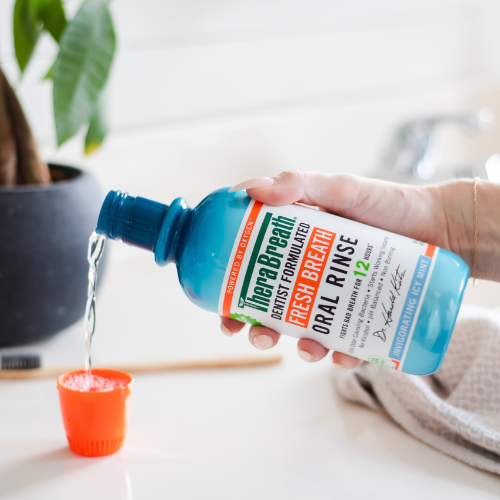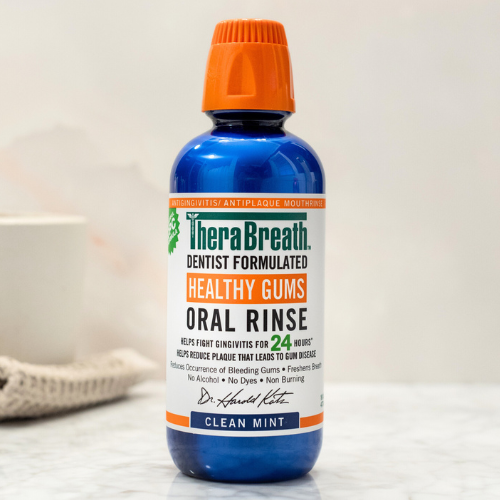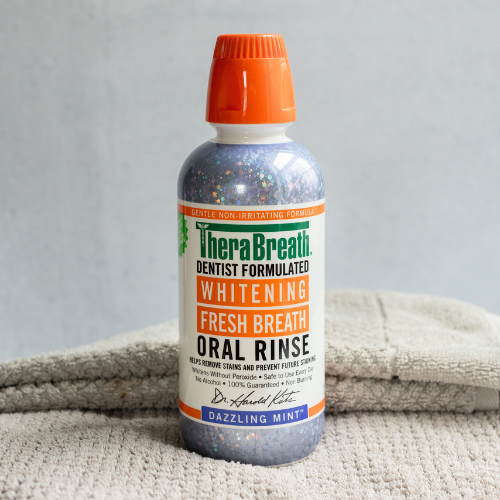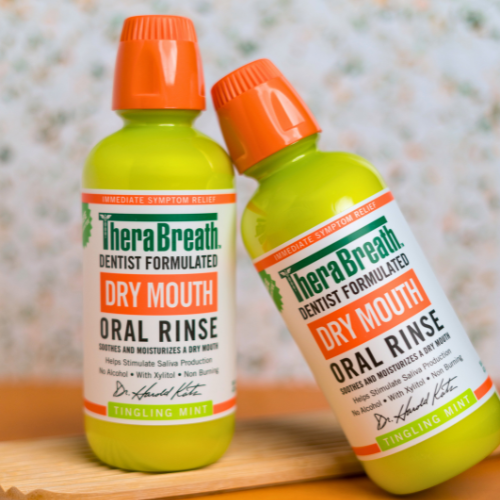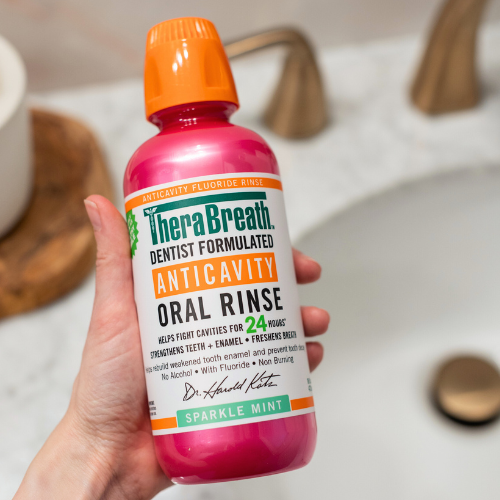
Dry Mouth Remedies
Share
There are numerous potential underlying causes of dry mouth (often referred to as xerostomia, the subjective sensation of dry mouth)). There are an equally numerous variety of treatments & remedies available for those suffering from dry mouth. Treatments are not one-size-fits-all — they differ from patient to patient based on the cause and severity of the condition. If you have chronic dry mouth, it is important to discuss this with your physician or dentist, who will help identify the underlying cause and offer treatment approaches. In some cases, your dentist may suggest a specific oral rinse and toothpaste, or your doctor might recommend a change in medications.
Home Remedies
Good oral hygiene: Brush twice a day with fluoride toothpaste and floss after every meal, both of which can help fight bad breath (halitosis) caused by dry mouth. The effectiveness of a mouthwash depends on its enzyme content and ability to target bad-breath. It is important to select a mouthwash that contains the following key ingredients.
Xylitol is a sugar alcohol that helps prevent dental decay and oral bacterial growth. Studies have shown xylitol helps saliva remineralize dental enamel before bacteria have a chance to start eroding teeth. Additionally, xylitol creates an alkaline condition in the mouth that provides weak enamel with beneficial phosphate salts and calcium.
Zinc chloride reacts against anaerobic bacteria to reduce sulfur excretion and halitosis. While a mouthwash with zinc cannot effectively treat halitosis, this ingredient can help hydrate the mouth and reduce other problems related to dry mouth such as cracked lips, sore throat, and decreased taste sensitivity.
OXYD-8®, a proprietary stabilized oxychlor compound created by TheraBreath founder Dr. Harold Katz, is a highly effective compound that defeats bad breath. It also eliminates bitter, metallic, or sour tastes that frequently affect people with chronic halitosis and dry mouth. By removing electrons from the chemical composition of an overly acidic mouth, OXYD-8® produces an oxygen rich environment in which anaerobic activity is severely curtailed.
Proper hydration: Being adequately hydrated makes it easier for the body to produce saliva. If you are dehydrated, consuming large amounts of water can help you rehydrate. If you have a chronic problem, drinking sufficient amounts of water on a daily basis will help give your body the resources it needs to more consistently produce saliva. For example, if performing or public speaking is integral to your career, it is helpful to drink and swish water in your mouth before going on stage so you don't experience dry mouth in front of an audience.
Eliminate bad habits: Drinking sugary or diet soft drinks and caffeinated beverages, smoking cigarettes, and consuming alcohol can greatly hinder the moisture in your mouth. If you can, it is best to avoid or curtail all of these activities. Following a healthy diet and lifestyle can help you combat dry mouth as well as halitosis.
Sugarless candy and chewing gum: Sucking on sugarless candy or chewing sugar-free gum helps stimulate the production of saliva. In fact, doing this throughout the day is an easy and sweet way to temporarily help alleviate this problem. It is important the candy or chewing gum you use is sugarless, because sugar-laden products may not only make this issue worse, but will also promote dental decay.
Baking soda: Sprinkle a small amount of baking soda on the bristles of your dry toothbrush. Place toothpaste over the baking soda to cover the bristles and then brush. The baking soda effectively neutralizes more oral acids responsible for bitter or metallic tastes and produces a cleaner taste sensation.
Olive oil: Swishing a small amount of olive oil in the mouth can help alleviate a dry, sticky mouth. This leaves a protective coating on the tongue, back of the throat, and cheeks — effectively locking in moisture.
Citrus juice: Drinking citrus juice can help remedy dry mouth by breaking down a dense accumulation of mucus that causes breathing through the mouth. Make sure the juice is pulp-free so it does not leave behind a potentially irritating residue.
Humidifiers: A dry environment can cause people to breathe through the mouth instead of the nose. Passing a lot of cool air through the mouth causes everything on the inside of the mouth to dry out more quickly. A humidifier in the bedroom, especially during winter months can help remedy this situation. Another option is a whole-house humidifier that can be installed as part of the home's HVAC system.
Remedies for Medication-Induced Dry Mouth
If you are taking medications and suspect this might be the cause of your dry mouth, it is important to discuss this with your doctor and disclose all of the prescribed and over-the-counter drugs you are currently taking. A drug log will include the dosage, name of the prescribing doctor, and when you first started taking the medication. Once the drug list is complete, the doctor will be able to identify which drugs in the list have a known mouth drying side effect. In some cases, there may be another option that does not cause this problem, however, substitutes are not always available. In some instances, reducing the medication dosage may be enough to decrease or eliminate dry mouth. If this does not work, your doctor may prescribe drugs such as pilocarpine (Salagen) and cevimeline (Evoxac), which are highly effective in stimulating the salivary glands.
Remedies for Disease-Induced Dry Mouth
Salagen and Evoxac are often prescribed for people with Sjögren's syndrome, an autoimmune disorder that causes the body to erroneously attack the salivary glands, damaging their ability to release saliva. Radiation can damage salivary glands, and chemotherapy can cause saliva to thicken, making the mouth feel dry. Many cancer patients find relief by using dry mouth rinses and sprays on a frequent basis, while others opt for over-the-counter saliva substitutes. People with diabetes can reduce or eliminate this problem by carefully checking glucose intake, eating the right foods, taking medication as directed, maintaining a healthy weight, and regularly monitoring insulin levels.
TheraBreath® Products to Treat Dry Mouth Symptoms
Dr. Katz Discusses the Best Mouthwash to Relieve Dry Mouth Symptoms
In this video, Dr. Katz discusses the best mouthwash to alleviate dry mouth symptoms and how to use it effectively.
TheraBreath Dry Mouth Rinse, the newest mouthwash in the TheraBreath line, combines soothing, moisturizing enzymes with natural salivary enhancers, a breakthrough solution to help alleviate dry mouth symptoms. It is formulated to naturally enhance saliva flow as it soothes and moistens your mouth and oral tissues.
During a busy day between meals, or running from meeting to meeting, you will be glad you have TheraBreath's Dry Mouth Lozenges on hand. Sugar-free, they keep your mouth moist, enhance saliva flow, and freshen your breath with a great citrus mint flavor.
Regular use of these TheraBreath products will help leave your mouth feeling cool, fresh, and hydrated. Find out what millions of Americans already know. Click here to read some of their success stories.
